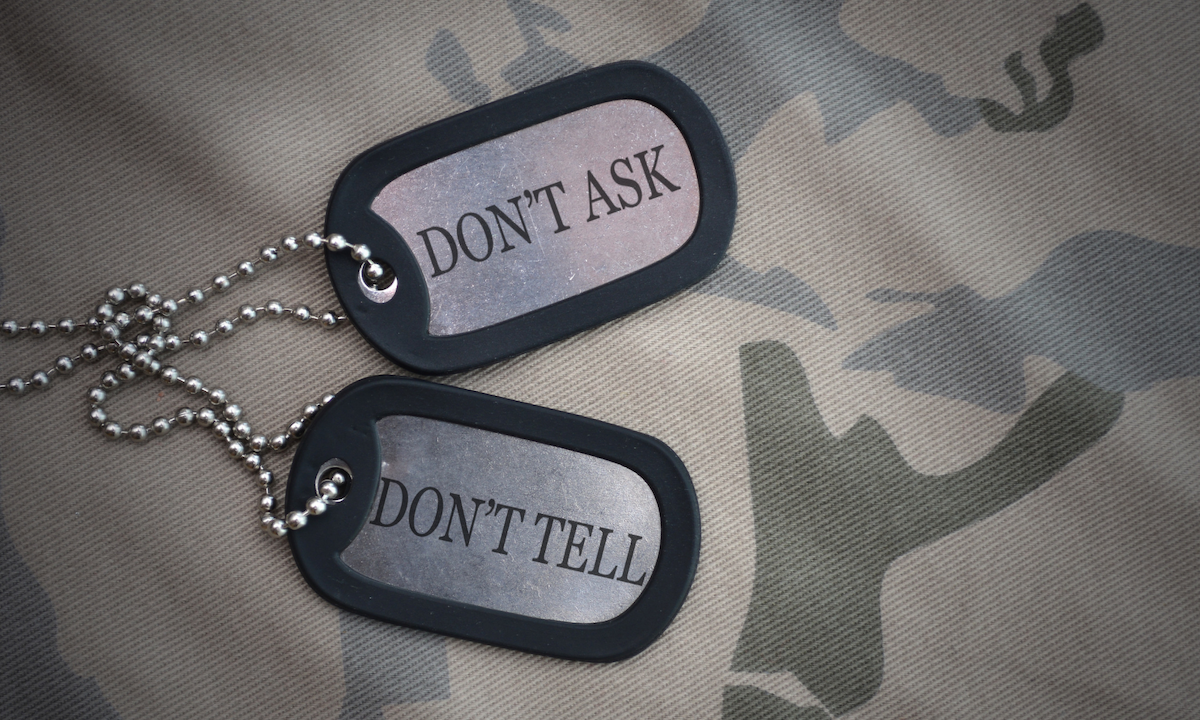Seven years ago today, the deeply harmful “Don’t Ask, Don’t Tell” policy officially came to an end — opening the door for gay, lesbian, and bisexual troops to serve openly in the military as their authentic selves. These three service members reflect back on that incredibly important progress:
Jesse ‘Jac’ Thomas
Ensign, MSC, United States Navy (2017-Current)
Nuclear Machinist Mate First Class, Surface Warfare (2010-2017)
There is a shockingly low percentage of people even eligible for military service. Of those who decided to join, we all have our reasons. Some were looking for a job, others had a call to action. For me, it was being enamored with the Navy at a young age coupled with the experiences the Navy offered.
Having been enlisted and now commissioned, my sense of pride of service is steeped in something more. I am prideful of the people I get to work alongside. Being a part of an organization that is mission driven and where people are expected to lead at any rank is a source of immense pride. Those I deployed with and those I have spent time ashore with have been some of the greatest friends and colleagues one may ever ask for. We each have a role in accomplishing a common mission set. Even if I have not formally worked with another service member, we have shared experiences and expectations of one another.
Some may have a great sense of pride from one tour or a career track. I am happy to work with this talented and diverse group regardless of service length. We hold strength in our diversity which is fairly reflective of our population as a whole (see Military OneSource data). Even so, we continue to add strength in diversity while still being called the most lethal fighting force the world has known.
It is no surprise being around this fantastic team that I was able to meet my spouse. Almost five years together, it has been a shared adventure going to different duty stations. We’re proud to be equally vested in our naval careers. We’re excited to have a new adventure together next year PCSing to San Diego.
Had the repeal of DADT not happened, I will still have had great pride in the Navy. However, there would be a very different story told above. Even though DADT repeal was only seven years ago, it seems much older. Culturally we’re in an organization that typically looks at the merits of an individual. There is always room to improve, but I’m glad to be in an organization who remains mission driven and committed to excellence.
When I was in high school, I was attracted to the military, particularly the Air Force. My father served in the Army Air Corps (the precursor to the Air Force) in World War II and was very devoted to the Air Force. He instilled a lot of that affection in me. When I was thirteen, I even had the rubber-bands on my braces changed to the Air Force colors! This was at a time when “Don’t Ask, Don’t Tell” was in effect. I’m gay, and I wasn’t willing to join the military only to lie about who I am. I always felt a pang when I spoke to people in the military or watched military ceremonies. I couldn’t help but feel that I belonged in that circle, but I thought that it was simply not a path that was open to me.
By luck, one of my classmates in graduate school joined the Air Force while we were in school. I was so surprised that the military had midwives! I wasn’t quite certain how it worked, but the idea of being an Air Force midwife lodged itself in my brain. In 2011, the same year I graduated midwifery school, DADT was repealed and the United States military began to allow gay service members to serve openly. On hearing the news, my heart soared. After I had been at my first job for two years, I contacted a recruiter and began the process to join.
It has been a little over three years since I joined the Air Force and I love it. I love the sense of being a part of something larger than myself. I love the feeling of being connected with everyone I see on base, whether they’re in my unit or not. I love providing women’s health care to service members and their families. Every evening at 1630, when Retreat and the National Anthem play, I always think about my father and reflect on the path it’s taken to get where I am.
I believe in visibility. Everyone I work with knows who and what I am. I met my wife in the Air Force and we make it a point to attend events together and talk about one another. I think it’s very important that people see LGBT service members—both those who promote and fight for LGBT rights, and those who support the military. I can think of no greater honor in my life than to serve America in the Air Force, and I am immensely grateful for those who worked and strove to make it possible.
HM1 (FMF/SW) J. Priela-Tam, United States Navy
I recently saw a friend of mine, Anne Geiman who was promoted to Yeoman First Class in the Naval Reserves. I’ve known of Anne for practically the whole length of the post-DADT period. I knew of her via social media, much like most of the other advocates and warfighters who identify as LGBT, and tracked her progress and her career. She’s served on one of the most technologically sophisticated and lethal weapons platforms in the Navy’s arsenal. Specifically, she worked with a weapon system that could spit depleted uranium rounds at a thousand rounds a minute, providing close in defense from air, missile and surface attack. She even managed to establish a Navy recognized Gay Straight Alliance (GLASS – Gay, Lesbian and Supporting Sailors) that has taken root on major forward deployable platforms.
I’ve also been following the career of trans service member Staff Sergeant Ken Ochoa — an Army Drill Instructor — and his epic tales of pushing recruits. In this capacity he successfully pushed boots through the Army’s Boot Camp requirements, turning what were once civilians into professional soldiers for the US Army.
They are one of the hundreds of LGBT families in the American Military Partner Association, a non-profit that I read through as part of my daily ritual to catch up on stories, struggles, victories and hilarious stories of domesticity. I also follow the ongoing pro-bono legal support of OutServe-SLDN, which goes to trial against discriminatory practices and simultaneously works to upgrade discharges from the DADT-era.
I consider my own service wholly unremarkable, with nothing really big to shout about. I sort of prefer it that way. But I will tell you, the common thread that has consistently manifested itself through all of these individuals is they continue to serve with dignity and grace. Despite the hardships that each of these upstanding and productive citizens face, their commitment to serve is awe inspiring. They continue to advance in rank. They are awarded commendations and personal achievement medals. They deploy, they lead, they innovate, they run to the sound of danger, but more importantly, they thrive.
Ten years ago, when Don’t Ask, Don’t Tell was very much alive, people like us would have been fired and or summarily ejected from the military without any benefits or even so much as a thank you. Even if you were the most efficient warfighter, technical expert or highest ranking officer, we’d still have been thrown out. Go back even further and the summary punishments attached would have set you up for failure in the post-military life.
LGBT military service members will continue to serve as long as this republic continues to exist. They are more than willing to sacrifice themselves and their very basic freedoms to allow the rest of society to enjoy theirs. Even if others in this society abuse theirs by denigrating the very citizen warriors that have sacrificed so much. They will be there — on watch — as a steady vanguard against enemies both foreign and domestic. They will serve with diligence, with integrity, with decency, lethal proficiency, with undying loyalty; and most importantly, with the core values of honor, courage and commitment.


